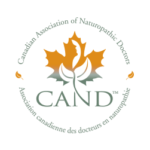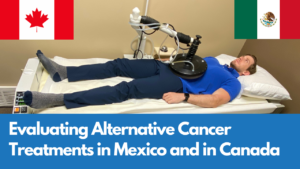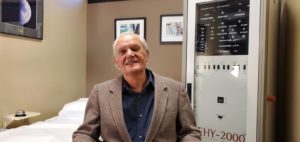Introduction
Meningioma Case Study
In this article we’ll share the details of a recent 42 year-old patient who was initially misdiagnosed during pregnancy with headaches and neck pain. Diagnosed with an aggressive meningioma tumour, she said her oncology team was surprised by her results by using our conjunctive cancer treatments, increasing her quality of life and defying her initial prognosis. It’s important to keep in mind that every patient will have a different experience with their meningioma brain tumour diagnosis. After sharing Dr Ceaser’s reflections on this case you can find some answers to frequently asked questions (FAQ) about meningioma.
I want to learn more about brain tumours and cancer
If you’re looking for a deeper dive including 3 case studies of various forms of brain cancer and brain tumours, check out: Transforming Brain Cancer Prognosis: Winnipeg’s Naturopathic Success Stories. The article includes four cases including: All four case studies will provide you with a knowledge base, inspiration, and confidence in naturopathic protocols offered by Dr. Ceaser.
Health Canada
We adhere to Health Canada regulations, preventing us from explicitly detailing naturopathic therapies. However, our protocols have positively impacted many individuals with brain cancer and tumours, enhancing their quality of life. Our approach aims to complement conventional treatments, making radiation therapy and chemotherapy more effective while mitigating associated side effects.
Dr. Ceaser reflects on her journey:
“Picture this – a 42-year-old woman, navigating the complexities of Meningioma during pregnancy. Initially dismissed as common pregnancy-related discomfort, her symptoms escalated post-delivery, leading to the discovery of a formidable brain tumour. The challenge was daunting, especially with the tumour’s aggressive nature. Conventional treatments, like radiation, proved ineffective, and her prognosis was dishearteningly brief.
Refusing conventional options, she turned to naturopathic treatments at our Centre. Though the specifics are regulated, our tailored approach helped stabilize her condition. The outcome defied expectations, granting her not just six more years but six years filled with family, friends, and a remarkably fulfilling quality of life. It’s a testament to resilience and the profound impact of personalized care. Again, results differ among individuals and these results are not the only results patients may experience.
Meningioma FAQS
We’ve compiled answers of the most frequently asked questions about Meningioma brain tumours. If you require more information, contact the Centre to speak to us or schedule a consultation.
What Is Meningioma?
Meningioma brain tumour, arising from the protective membrane enveloping the brain and spinal cord, emerges as the most prevalent primary brain tumour in adults. The majority of these tumours, ranging from 85-90%, are characterized as benign, offering some reassurance. However, the remaining 10-15% fall into the categories of atypical or malignant meningioma, introducing complexities and concerns.
Why Benign Can Be Misleading
The term “benign” may seem comforting, but it can be misleading. The impact of a benign meningioma hinges on its location and growth rate. It has the potential to exert pressure on vital nerves, compress the brain, and, in severe cases, pose a life-threatening risk. This uncertainty can be overwhelming, and it’s important to navigate these nuances with care.
Who Is Susceptible To Meningioma?
Meningiomas commonly discovered in individuals aged 40 to 70, with a higher occurrence among women, adding another layer of consideration and awareness. Detecting meningiomas in around 3% of people over 60 underscores the importance of understanding the factors contributing to their occurrence.
How serious is meningioma?
The seriousness of a meningioma depends on various factors, including its size, location, grade, and how well it responds to treatment. Many meningiomas are slow-growing and benign, posing a lower risk. However, some may be more aggressive or impact critical areas of the brain, leading to more serious consequences.
What is the average life expectancy with meningioma?
Life expectancy with meningioma varies widely and depends on factors such as the tumour’s characteristics, the individual’s overall health, and the effectiveness of treatment. Many people with meningiomas experience a normal lifespan, especially if the tumour is low grade and successfully treated.
At what size should a meningioma be removed?
The decision to remove a meningioma is not solely based on its size but involves consideration of factors such as symptoms, location, and the potential for growth. Small, asymptomatic tumours may be monitored rather than immediately removed. Larger tumours or those causing symptoms may prompt surgical intervention.
Can meningioma be cured?
Treatment for meningioma often involves surgery, and in many cases, complete removal is possible. However, the potential for a cure depends on factors such as the tumour’s characteristics and grade. While some meningiomas can be cured, others may have a higher chance of recurrence. The overall prognosis varies, and ongoing monitoring may be necessary even after successful treatment.
When should a meningioma be removed?
The decision to remove a meningioma depends on factors such as its size, location, symptoms, and the individual’s overall health. Small, asymptomatic tumours may be monitored, while larger or symptomatic tumours may require surgical removal. A healthcare professional can assess each case and recommend the most appropriate course of action.
What causes meningioma to grow?
The exact cause of meningioma growth is often unknown. Factors such as genetic mutations and hormonal influences may play a role. Additionally, there is ongoing research to better understand the molecular and genetic factors contributing to the development and growth of meningiomas.
Can a meningioma cause sudden death?
In general, meningiomas are typically slow-growing tumours, and sudden death directly attributed to a meningioma is rare. However, complications can arise depending on the tumour’s location and size, potentially affecting vital structures in the brain. Any sudden or severe symptoms should be promptly evaluated by a medical professional.
Average Life Expectancy with Meningioma?
Life expectancy for individuals with meningioma varies based on several factors, including the tumour’s characteristics, grade, size, and how well it responds to treatment. Many people with meningiomas experience a normal lifespan, particularly when the tumour is low grade and successfully treated. However, the prognosis can be more variable for higher-grade tumours or those in challenging locations.
How Serious is a Meningioma?
The seriousness of a meningioma depends on various factors. Many meningiomas are slow-growing and benign, posing a lower risk. However, some may be more aggressive or impact critical areas of the brain, leading to more serious consequences. The seriousness of a meningioma is determined by its characteristics, location, and the effectiveness of treatment.
Why should I have a team of healthcare professionals in addition to my medical doctors?
A diverse healthcare team, comprising doctors, nurses, social workers, physical therapists, and naturopathic doctors, is crucial for comprehensive brain cancer care. This collaborative approach aims to manage symptoms, offer emotional support, improve nutrition, and enhance overall well-being. Recommendations for a high quality of life involve staying engaged with the healthcare team, prioritizing self-care with a balanced diet and exercise, managing stress, seeking emotional support, and exploring complementary therapies. This holistic strategy ensures personalized care, potentially improving the quality of life during cancer treatment.
Is Meningioma Classified As Cancer?
While typically benign (noncancerous), meningiomas can occasionally exhibit a cancerous (malignant) nature. Importantly, even if a meningioma is deemed benign, its potential to grow significantly can lead to compression of vital nerves and structures in the brain, posing risks that extend to harm and, in severe cases, life-threatening consequences. Understanding these nuances is crucial for informed considerations and decision-making regarding meningioma.
What Signs Should You Look Out For?
Meningiomas, being slow-growing tumours, may not exhibit noticeable symptoms until they reach a size that causes pressure on surrounding structures. The specific symptoms can vary significantly depending on the location within your brain where the meningioma develops.
What Symptoms Are Associated with Meningioma?
The manifestation of meningioma symptoms is closely linked to the tumour’s location, influencing the approach to potential meningioma treatment. Meningioma symptoms often develop gradually, initially presenting as minor concerns that may persist over an extended period before a definitive diagnosis is reached. Depending on the meningioma’s location, symptoms can encompass:
-
- Headaches
-
- Blurred vision
-
- Seizures
-
- Numbness
-
- Weakness in arms or legs
-
- Speech difficulties
-
- Memory loss
-
- Hearing impairment
How Is Meningioma Diagnosed?
The diagnosis of meningioma is established through imaging examinations. Since many meningiomas exhibit slow growth and symptoms may not emerge suddenly, meningioma might not be the initial consideration when symptoms arise. Imaging tests, such as Magnetic Resonance Imaging (MRI) for detailed brain images and Computerized Tomography (CT) scans for intricate X-ray images, are employed to identify and diagnose meningiomas.
Where Does Meningioma Develop?
Meningiomas can grow in different parts of the brain and spine, each having its own unique traits. For example, a Cavernous Sinus Meningioma forms near a critical blood drainage area, while a Cerebellopontine Angle Meningioma is located by the cerebellum border, often linked with acoustic neuromas. Some might appear on the upper surface of the brain, near the base of the skull, or even around the eye sockets. Others can be found within the fluid-filled chambers of the brain or along the nerves connecting the nose to the brain). Understanding these locations helps grasp the impact and potential treatment of meningiomas in specific areas.
What Are The Grades Of Meningiomas?
Meningiomas have different grades based on their characteristics. Doctors determine the grade through factors like tumour location, type, spread, genetic findings, age, and post-surgery remaining tumour. Molecular testing helps identify subtypes linked to location and disease characteristics.
Grade 1: meningiomas are the most common and are considered low grade, meaning they grow slowly.
Grade 2: or atypical meningiomas, are mid-grade tumours with a higher chance of returning after removal. These include subtypes like choroid and clear cell meningioma.
Grade 3: anaplastic meningiomas are malignant or cancerous, growing rapidly. Subtypes in this grade include papillary and rhabdoid meningioma.
What Are The Meningioma Treatment Options?
The approach to treating meningioma is tailored to individual factors such as tumour size, location, growth rate, associated neurologic symptoms, age, and overall health. Meningioma treatment encompasses four options:
1. Observation: For small, asymptomatic tumours, regular CT or MRI scans are conducted to monitor any potential growth
2. Surgery: The primary goal is to completely remove the tumour along with the membranes of origin. The complexity of surgery depends on the tumour’s location and involvement with nearby nerves and blood vessels.
3. Radiation: In some cases, radiation may be combined with surgery, especially for aggressive meningiomas.
4. Naturopathic complementary care: encompasses a wide range of treatments and protocols designed to support the body’s natural healing abilities. These therapies are tailored to the individual’s health needs.
Meningioma The Challenging Journey
Recognizing potential symptoms is crucial for early detection and seeking appropriate medical attention if you suspect meningioma. When facing any serious diagnosis, knowledge becomes a powerful ally. Understanding these factors not only informs the comprehensive approach to managing meningiomas but also empowers individuals and their support networks with the awareness needed to navigate this challenging journey.
A Team Effort
Imagine this journey as a team effort, where a diverse healthcare team, including doctors, nurses, social workers, physical therapists, and naturopathic doctors, comes together to provide comprehensive care. This collaborative approach focuses not only on medical aspects but also on managing symptoms, offering emotional support, improving nutrition, and enhancing overall well-being.
The Power of Community and Self Care
As you embark on this journey, staying connected with your healthcare team is key. Community becomes a powerful tool – ask questions, share concerns, and actively engage in your care. Prioritize self-care, incorporating a balanced diet, regular exercise, and stress management into your routine. Seek support from loved ones and explore avenues like support groups to connect with others on a similar journey.
In this holistic strategy, complementary therapies, such as naturopathic treatments, can play a role in managing side effects and enhancing your well-being. Remember, the goal is not just medical intervention but also improving your quality of life throughout the treatment process.
Your Unique Journey
Your journey with meningioma is unique, and this collaborative and holistic approach ensures that your care is tailored to your specific needs. With the right support and strategies in place, there is potential for an improved quality of life even as you navigate through the challenges of meningioma diagnosis and treatment.
Meningioma Conclusion
The journey through Meningioma Brain Tumours is not only a voyage into medical intricacies but a testament to the resilience of the human spirit. The amalgamation of informative insights and Dr Ceaser’s compassionate approach, illustrated through real-life success stories, underscores the impact of naturopathic protocols in transforming lives. Navigating the complexities of Health Canada regulations, the commitment to patient well-being shines through, reflecting years of dedication in developing protocols that prioritize individualized care.
Power In Knowledge
Understanding the multifaceted nature of Meningiomas, from the deceptive benign categorization to the potential life-threatening risks, emphasizes the need for careful consideration and a collaborative healthcare approach. The inclusion of a diverse healthcare team, combined with the power of communication and holistic strategies, reinforces the importance of tailored care for each unique journey.
Challenges And Triumphs
The courage and resilience encapsulated in Case Study 2, the story of a 42-year-old woman defying odds through naturopathic therapies, serve as an inspiring beacon. This journey, marked by challenges and triumphs, embodies the profound impact of personalized care on quality of life.
Empowerment
As individuals embark on their unique Meningioma journeys, armed with knowledge about symptoms, diagnosis, grades, and treatment options, the overarching message is one of empowerment. In the face of Meningioma’s challenges, the holistic approach outlined ensures that each person’s unique journey is met with understanding, collaboration, and the potential for an improved quality of life.
Dr.Ceasar’s Comprehensive Approach
While incorporating conventional cancer therapies, our comprehensive approach embraces the latest in natural, holistic, nutritional, and whole-body strategies.This not only eases the impact on the body during treatments but also holds the potential for enhanced effectiveness. The chosen treatment plan is a collaborative decision made by healthcare professionals considering the unique characteristics of each case.






